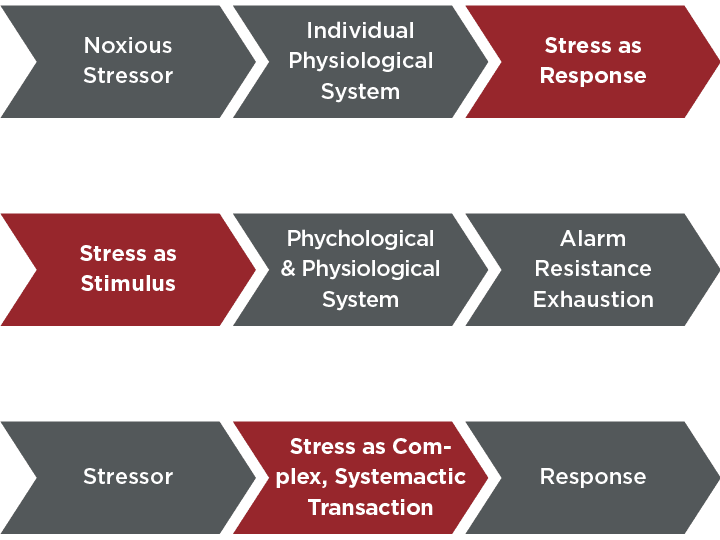How to Cope When Everything Seems to Be Going Wrong

By Dani Vaughan
Dealing with stress and changing situations is something that we will always have to deal with. As we move throughout life, our circumstances are constantly changing. Stress is something that will be a part of our lives and can fluctuate from minimal levels to more extreme. Coping with stress and being able to continue to function in our daily lives is extremely important as part of our mental and physical health.
Everyone comes from different situations and has different life experiences, but understanding how you best deal with stress as an individual is unique to you. Sometimes the best way to learn more about something is to look at some of the research and theories related to stress.
The first thing to look at is, what is stress? By definition, it is a state of mental or emotional strain that is the result of adverse or very demanding circumstances. Hans Selye, who is known as the “Father of Stress Research,” presented the following theory, that stress has been viewed as a response, a stimulus, and a transaction.
Stress as a Response
Stress can be described as a dependent variable and includes the following three concepts:
1. It is a defensive mechanism.
2. Three stages: Alarm, resistance, and exhaustion.
a. Alarm: Initiates the nervous systems to combat or avoid the stressor. Reactions such as increased heart rate, temperature, and adrenaline are all responses in the alarm stage.
b. Resistance: This is the flight or fight reaction to the stressor.
c. Exhaustion: Returning to homeostasis and generally accommodating the stressor.
3. If it’s prolonged or severe, it can be extremely detrimental.
Stress as a Stimulus
The theory of stress as a stimulus views stress as a significant life event or change that demands a response, adjustment, or adaptation. This theory assumes:
1. Change is inherently stressful.
2. Life events demand the same levels of adjustment across the population.
3. There is a common threshold of adjustment beyond which illness will result.
This model initially viewed the person as a passive recipient of stress, one who played no role in the intensity of the stressor. A change or life event could also be a positive or negative experience based on the individual's cognitive and emotional factors.
Stress as a Transaction
To explain stress as more of a dynamic process, this last theory presents stress as a product of a transaction between a person and their environment. Along with this theory is the concept of hardiness, this refers to an individual’s personality that distinguishes people who remain healthy under stressful circumstances compared to those who develop health problems.
The following graphic illustrates the three different theories of stress: stress as a response, stimulus, and transaction.

Coping with Stress
All of these theories give a glimpse into what stress is and many of the base concepts. Coping is the conscious and unconscious reaction to how we deal with problems and reduce stress. It is the mind and body’s way to try and restore itself to its optimum functioning state.
There are many ways to cope. Large amounts of literature, both popular and academic, all talk about stress management. Many jobs and industries are dedicated to helping people lessen and cope with stress. Listed below are a few examples of general stress management techniques:
| Cognitive | Physical | Environmental | Other |
|---|---|---|---|
| Therapy | Artistic Expression | Music | Conflict Resolution |
| Hobbies | Deep Breathing | Nature | Prayer |
| Meditation | Natural Medicine | Pets | |
| Mindfulness | Physical Exercize | Spa Visits | |
| Planning | Relaxation | ||
| Reading | Yoga | ||
| Time Management |
In psychology, coping skills or coping strategies are tools that we can use to avoid burnout. This can include our thoughts, emotions, and actions, and they are all dependent on our personalities. Someone who is very outgoing and sociable will most likely use a different technique than someone timid.
1. The ultimate goal of coping is to return to a state of balance.
2. Strategies can be positive or negative.
3. Coping is dependent on personality patterns and perceptual experiences.
4. It is never the same for two people. Choosing a strategy to cope is HIGHLY individualized.
We are all individuals and react to situations differently. What may be extremely stressful for one person may not have the same influence on someone else. Never compare your circumstances to another person. How we each deal with stress is unique and individual, some people might like to talk about their struggles with friends or family while going for a walk alone in the park would be the solution for someone else. We all experience stress, and things will happen to us that we cannot control. It’s our responsibility to know the best ways for us to cope and then be willing to make the steps to change and make our lives better.
Sources
https://opentextbc.ca
https://positivepsychology.com
